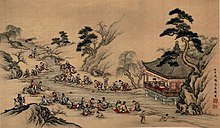

A winding stream party (Chinese: 流觴曲水/曲水流觴; pinyin: liúshāngqūshuǐ) is an old Chinese custom in which the participants wait by a winding stream and compose poems before their cups full of rice wine float down to reach them. It was popularized by Wang Xizhi, and dates back as far as 353; poems composed at this event were recorded in Wang's famous work, the Lantingji Xu.

This Chinese custom was adopted by the Koreans, such as the party in 927, hosted by King Gyeongae of Silla, in Poseokjeong, Gyeongju.

It was also adopted by the Japanese and was called Kyokusui-no-en (曲水の宴, Winding stream party), a party game played by the nobility. Participants must compose a tanka poem beside a stream, within a time limit set by the passage of a lacquer cup of sake floating towards them on the water. When the cup reached the poet, they were expected to drink its contents, either as a celebration of the poem's completion or as a forfeit if they had not composed a suitable verse in time. The first kyokusui-no-en events were reportedly held in the Kofun period during the reign of Emperor Kenzō, making the ceremony around 1,500 years old. Other sources, however, suggest that the game originated in the Heian period, around 500 years later; it appears in scrolls from that period and is mentioned in The Pillow Book of Sei Shōnagon.
The ceremony is still performed at the Tenman-gū Shrine in Dazaifu and also in Kyoto. The modern Japanese version of the ceremony was created in 1963; participants dress in Heian era costumes of the nobility and musical accompaniment is provided on the koto.
References
- Helaine Selin (12 March 2008). Encyclopaedia of the History of Science, Technology, and Medicine in Non-Western Cultures. Springer Science & Business Media. p. 959. ISBN 978-1-4020-4559-2.
- ^ Brian Bocking (30 September 2005). A Popular Dictionary of Shinto. Routledge. p. 86. ISBN 978-1-135-79739-3.
- Karen Brazell (1998). Traditional Japanese Theater: An Anthology of Plays. Columbia University Press. p. 217. ISBN 978-0-231-10873-7.
- Frank & Kikuchi Brinkley (1912). A History of the Japanese People From the Earliest Times to the End of the Meiji Era. Library of Alexandria. p. 375. ISBN 978-1-4655-1304-5.
- Jien; Delmer Myers Brown; Ichirō Ishida (1979). The Future and the Past: A Translation and Study of the Gukanshō, an Interpretative History of Japan Written in 1219. University of California Press. p. 259. ISBN 978-0-520-03460-0.
- ^ "Kyokusui no En Festival". Cross Road Fukuoka. Fukuoka Prefecture Tourist Association. Retrieved 10 May 2017.
- ^ Luchinskaya, Daria. "Report: Kyokusui no En (曲水の庭) – a Heian Poetry Festival" (PDF). St Anne’s Conferences. Retrieved 10 May 2017.